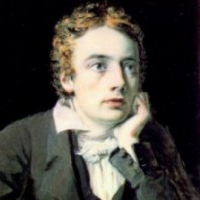John Keats - Biography and Works
John Keats was born in north London as the son of Thomas Keats, who worked at a livery stable; he was the eldest of four sons, one of whom died in infancy, and a daughter. His father died when he was nine and his mother died when he was fifteen, due to tuberculosis, which also took the lives of three of her sons, including John Keats, who died at the age of 25 years.

John Keats (1795-1821)
From the age of 8 to 16 Keats attended school, towards the end of which he had begun to read widely and even undertake a prose translation of the Aeneid from its Latin version. By profession he was a surgeon, but he decided to become a poet. His interest in poetry had begun at school and grown while he was studying medicine, where his practical-minded uncle had made him go without much of his wish. He wrote his first poems when he was nineteen and passed his medical examinations when he was 21 (1816), but he left it within a year and chose to become only a poet; he also published a few poems that year.
In his first publication, a sonnet titled "O Solitude", Keats first of expressing the hope that if he is to be alone, it will be in "Nature's observatory''. In April and May of 1819 he composed a group of five odes which are ranked as the greatest short poems in the English language by the critics. All of his major odes possess the distinctive qualities of the work of his maturity - a slow paced, gracious movement; a concreteness of description in which all the senses combine to give the total apprehension of an experience, usually mixing them up; an intense delight at the sheer existence of things outside himself; losing of his own identity in the contemplation of the things and his identification with them; and a concentrated felicity of phrasing.
His poetic career is one of the shortest among the greatest of poets, and therefore, one of the most amazing. Beginning as a fanciful romantic poet with a charge of adolescence in his temperament, Keats quickly matured into a creative and imaginative thinker. Though he carried on the ideas of fancy, sensation and imagination to the end of his poetic career, these elements are refined by mature thoughts, and creative and philosophic faculty in his later poems. For Keats, the sensation itself was cognitive: "It was a path to the knowledge of reality". His early poetry manifests a strong tendency to escape from the real and its conflict with the ideal. His later poetry evolves from contrary of life, but the contrary does not remain opposites: with realization and acceptance, they make complementary facets of the underlying reality of life. The real and the ideal, the ugly and the beautiful, escape and acceptance, man and nature, the temporal and the timeless, the mortal and the immortal are some of the common themes of Keats' major odes.
It is true that the real and the ideal are separate and conflicting entities. But one cannot be taken in isolation and understood without understanding the other. The world of material reality was bitter indeed for Keats and that of ideal beauty offered him with the possibility of momentary escape from the dreary and painful effects of ordinary experience. Certainly, in almost all his poems Keats has tried to escape into the realm of the ideal. But, throughout all of them, there also runs the haunting sense of reality. Although Keats has tried to escape from the strains of life, he has nevertheless asserted the values of the real world. He has ultimately understood and reconciled himself to the inevitable limitations of life.
The real life of John Keats was very tragic and pathetic, perhaps the most unfavorable one among the greatest English poets. After he decided to become a poet and pursue the ideal, misfortunes fell upon him and a series of disappointments and disasters tortured his real life. His earlier series were attacked savagely by the Tory-biased Blackwood's Magazine and The Quarterly Review. The hostile criticism deeply wounded the poet and in the opinion of some critics, and hastened his death. Besides, he had to helplessly watch his brother Tom pass away with tuberculosis. He felt exhausted, depressed and downcast. With his poetic ambition exciting his imagination and his desperate love affair with the unimaginative Fanny Brawne and a failing health, his attitudes towards real life became bitter. In addition, he was not in better position so far as the financial condition is concerned. Thus, the external conditions compelled his brave spirit into a sense of bitterness and resentment. He longed to escape from the world of misery into some ideal world of perfect happiness.
This ideal world is to be found even in his later poems, but it is never isolated from the real world. By presenting two contrasting worlds, he seems to have developed an understanding and acceptance of the real world of bitterness even better. He also seems to have developed the sense of underlying reality beneath the surface of the ideal, and a more permanent and profound sense of reality beneath the actual.
Cite this Page!
Sharma, K.N. "John Keats - Biography and Works." BachelorandMaster, 11 Nov. 2013, bachelorandmaster.com/biography/john-keats.html.
Related Topics
Ode to Autumn: Summary and Analysis
Ode on a Grecian Urn: Summary and Analysis
Ode to a Nightingale: Summary and Analysis
Ode to Psyche: Summary and Analysis
Ode on Melancholy: Summary and Analysis
Endymion: Summary and Analysis
The Eve of St. Agnes: Summary and Analysis
Bright Star: Summary and Analysis
Le Belle Dame Sans Merci: Analysis
On First Looking into Chapman's Homer: Analysis
The Terror of Death (When I have Fears): Analysis
 |
bachelorandmaster.com |